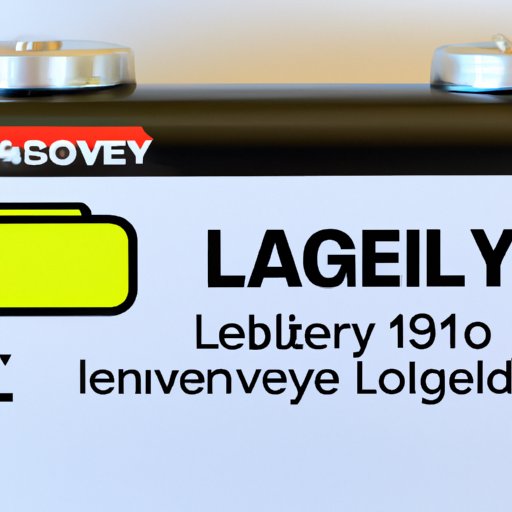Introduction
The term “lithium battery” refers to any type of rechargeable battery that uses lithium-ion or lithium-metal cells. These batteries are commonly used in laptops, cell phones, and other electronic devices, making them essential for travelers. However, when it comes to air travel, lithium batteries must be handled with extra care due to their potential fire hazard. In this article, we will explore how to safely and successfully travel with lithium batteries.

Research Airline Regulations and Restrictions
Before traveling with lithium batteries, it is important to research the specific regulations and restrictions of the airline you will be flying with. This will help you determine which types of batteries are allowed, as well as what restrictions may be placed on checked luggage, carry-on baggage, and on-person transportation.
Types of Lithium Batteries Allowed
Most airlines allow passengers to bring lithium ion batteries with an energy rating of 100 watt hours (Wh) or less. Some airlines may also allow lithium metal batteries with a rating of 2 grams or less. It is important to check with your airline to make sure they do not have additional restrictions or requirements.
Regulations for Checked Luggage, Carry-on Baggage, and On-Person Transportation
When traveling with lithium batteries, it is important to be aware of the regulations regarding checked luggage, carry-on baggage, and on-person transportation. Most airlines require that all lithium batteries must be carried in the cabin of the aircraft, rather than in checked luggage. Additionally, some airlines may restrict the number of batteries that can be brought on board. It is important to check with your airline for specific rules and regulations.

Buy Protective Cases for Your Batteries
It is highly recommended that you purchase protective cases for your lithium batteries. These cases can provide additional protection from damage and short-circuiting, reducing the risk of potential fires. Hard carrying cases are best, as they are more durable and less likely to break open. You can find these cases at most electronics stores, as well as online.
Pack Your Batteries Separately From Other Items
When packing your lithium batteries, it is important to keep them separate from other items in your luggage. They should be packed in containers specifically designed for batteries, such as plastic bags or boxes. This will help prevent the batteries from coming into contact with other items in your luggage, which could potentially cause damage or short-circuiting.

Keep Your Batteries Fully Charged
It is important to make sure your batteries are fully charged before you travel. This will ensure that the batteries are functioning properly and reduce the risk of potential fires. Additionally, it is a good idea to bring a charger with you in case the batteries run low during your travels.
Label Your Bags Accordingly
To alert airline personnel to the presence of lithium batteries in your luggage, it is important to label your bags accordingly. The International Air Transport Association (IATA) provides warning labels that can be used to indicate the presence of lithium batteries. These labels should be clearly visible on all sides of the bag.
Conclusion
Traveling with lithium batteries can be a challenging but necessary task for many travelers. By researching airline regulations and restrictions, purchasing protective cases, packing your batteries separately from other items, keeping them fully charged, and labeling your bags accordingly, you can ensure that your travels with lithium batteries are safe and successful.
(Note: Is this article not meeting your expectations? Do you have knowledge or insights to share? Unlock new opportunities and expand your reach by joining our authors team. Click Registration to join us and share your expertise with our readers.)
